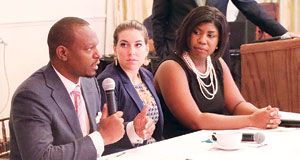
Budgeting for future hurricane relief, assigning relief benefits, higher education, and community redevelopment agencies (CRAs) were the hot topics discussed at the legislators forum on Tuesday, October 17, at Highland Manor.
The forum, organized by the Apopka Area Chamber of Commerce, allowed constituents and elected officials to hear Sen. Randolph Bracy (D-Ocoee), and Florida House reps. Kamia Brown (D-Ocoee) and Jennifer Sullivan (R-Eustis) preview the upcoming legislative session in Tallahassee. They spoke about their committees, the bills they’re working on and their session goals.
All the panel members represent Apopka and its surrounding area. Bracy represents District 11, which encompasses central and Northwest Orange County; Brown, State House District 45 that also includes Northwest Orange County as well as unincorporated portions like Pine Hills and Lockhart; and Sullivan, District 31 that includes Northwest Orange County and east Lake County.
Representative Robert Cortes (R-Altamonte Springs) was slated to participate but was unable to join. He was in Puerto Rico, assisting the island’s recovery relief, according to Chamber President Robert Agrusa. Cortes represents District 30, which includes Apopka as well as Altamonte Springs, Longwood, and Maitland.
Robert Stuart Jr. of GrayRobinson, an Orlando law firm, moderated the panel discussion.
Dr. Jerry Parrish, chief economist and director of research for the Florida Chamber Foundation, also gave an update on the Apopka area’s economic status.
The next regular legislative session resumes January 9, 2018.
Budgeting for future hurricane relief
The three legislators had different solutions on budgeting for future hurricane disasters and preparing for the influx of up to 200,000 people from Puerto Rico following Hurricane Maria’s destruction.
Sullivan said she has been pouring her efforts into connecting local businesses with local leaders to collect the storm debris still scattered throughout communities including Apopka. Contractors traveled to south Florida because they can make more money from cleanup projects, Sullivan said. She also said it’s important to listen to constituents’ concerns.
Brown said priorities must be made and to observe the influx of individuals to Florida, especially its impact on classroom numbers.
“Do we decrease the quality of education to bring folks in? No. I feel we should prioritize and make sure we provide for our public education system,” Brown said.
An audit the Florida Division of Emergency Management Services conducted a year ago concluded that the state was not adequately prepared for a hurricane, Bracy said. He said he would push for state departments to increase hurricane preparation.
“As a state, we need to do a better job,” he said, adding that the audit discovered that some contracts with debris pickup vendors had lapsed.
As an afterthought, Brown said conversations have occurred about Florida securing federal government reimbursement for hurricane disasters.
She also acknowledged that the agricultural community was affected. State Commissioner of Agriculture Adam Putnam has been traveling the state assessing storm impacts, she said.
Assigning benefits after a hurricane
Getting both the Florida House and the Senate to pass a bill on the distribution of hurricane relief benefits, such as insurance, has been a challenge for the past few years. However, all of the elected officials on the panel are confident that in spite of the hurdles, a bill would go through.
According to Sen. Bracy, a committee had a panel discussion on the issue to strike a compromise.
“We know there are fraud and abuse with these claims, but we also want to make sure that legitimate claims are paid,” he said. “So it’s not an easy task; it’s complex. But I think we’re on the road to getting a compromise, and so I feel good about that.”
Every year that Sullivan was a House representative (she was first elected in 2014), the House had a hurricane relief benefits bill that the Senate has yet to pass.
Admitting “there is so much waste, fraud and abuse” in the benefits distribution process, Sullivan said if only politics were shelved for the sake of doing right for constituents, a bill would go through.
Rep. Brown capped this topic of discussion by saying one word: “Ditto.”
CRAs
Another debate the Florida Legislature has been embroiled in is whether to eliminate CRAs.
Some claim these agencies have been mismanaging money allotted initially to CRA districts’ programs. Under Florida law, local governments throughout the state set up CRAs to oversee communities identified as in-need of certain, better provisions such as affordable housing and infrastructure. CRAs are tasked with drawing up and implementing plans with the goal of improving these targeted districts.
Florida has more than 220 community redevelopment areas according to the Florida Redevelopment Association, including one in Apopka.
In spite of the misgivings regarding the CRAs, they benefit residents living in the affected communities, according to Bracy and Brown.
CRAs are “important” for communities that experience high-crime rates, and CRAs manage funds for these areas whereas other money is earmarked for other places such as airports and International Drive, Brown said.
According to Rep. Sullivan, municipalities admitted they haven’t really used CRA funds well, but that the current legislation assisted in managing them. She called the legislation a “success even though it didn’t pass,” yet said that from the state’s standpoint, if other municipalities are mismanaging CRA funds, all of Florida suffers.
“So like with any government program that we have, we need to look at its effectiveness overall,” Sullivan said.
Bracy was brief with his statement.
“They (CRAs) are essential to making sure blighted areas are well-kept, so I think they serve a purpose,” he said. “Maybe we need to address some of the abuse of those funds, but to eliminate them all together is something I wouldn’t support.”
Higher education
When exploring solutions the Florida Legislature could adopt in developing the 21st-century workforce and hence growing the job market, each panel member approached the subject from different angles.
Sullivan said a rebranding of the general perception of the meaning of attending college must be done. That could start with examining each student’s strengths and weaknesses, then finding the best ways to prepare that youth for success, whether it’s technical school, community college, or a four-year state university.
“Quite frankly, not everyone is cut out for a four-year degree, or will best benefit from it,” she said. “That doesn’t make them more or less, but yet we brand it almost into our society as if it’s something to be frowned upon for not going to a four-year school.”
Bracy concentrated on a different segment of the population: prison inmates. As chair of the Florida Senate’s Criminal Justice Committee, he has a passion for helping inmates get back to work. He said that about 30,000 inmates per year are released into the community.
“One focus of mine is that each one has industry certification to work or at least apply or qualify for jobs,” he said.
Brown would like to see that Florida has a more diversified workforce available for college students, and ensure that jobs remain in the state instead of moving out of it.
